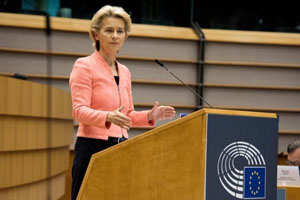State of the Union 2020: Building the world we want to live in – A Union of vitality in a world of fragility

date: 17/09/2020
See also: Charting the course for the year ahead
The plan (for further information see news item below) combines investment with much needed reforms to support the green and digital transition and was endorsed by European leaders in record time. For the first time Europe has put in place its own common tools to complement national fiscal stabilisers. At the heart of the plan is the European Green Deal, the EU’s blueprint for becoming the first climate-neutral continent by 2050. Based on wide public consultation and an extensive impact assessment, the Commission is proposing to increase the 2030 target for emission reduction to at least 55%. The EU will spend 37% of NextGenerationEU investment directly on European Green Deal objectives and will invest in European projects with the biggest impact: hydrogen, green building renovation and 1 million electric charging points. A second major thrust will be to develop a common plan for digital Europe with clearly defined goals for 2030, while following clear principles such as the right to privacy and connectivity, freedom of speech, the free flow of data and cybersecurity. To ensure that Europe is a leader in the data economy, the EU will build a European cloud. It will also focus on artificial intelligence, soon propose a secure European e-identity, and invest 8 billion euros in the next generation of supercomputers. The President recalled the efforts taken to protect workers with the creation of the SURE programme, which was a true sign of European solidarity and commitment to safeguard the dignity of work. To further protect workers and ensure fair competition in the single market, the Commission will also put forward a legal proposal to support Member States in setting up a framework for minimum wages.
